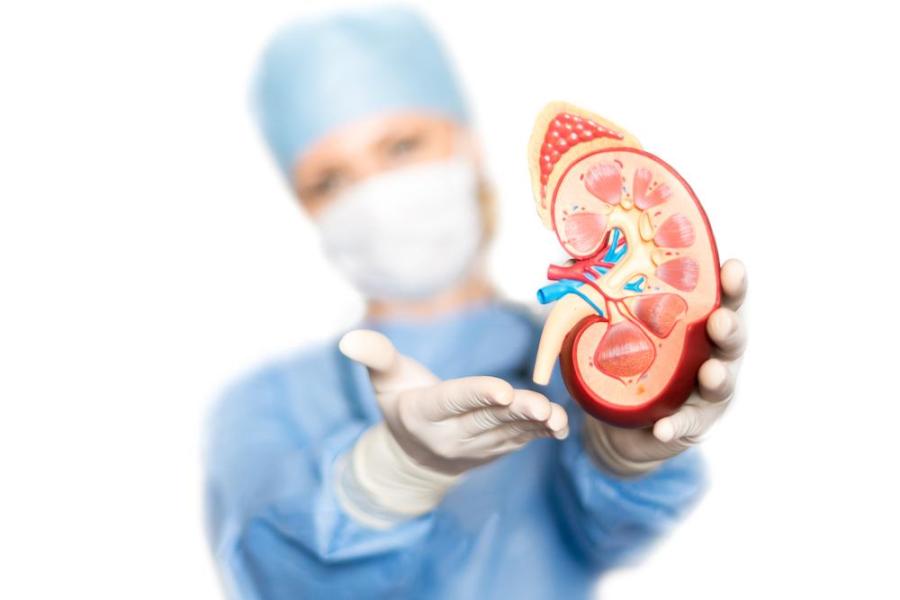
Diabetes: Kidney Complications
Neuropathy is a kidney disease that is caused by damaged capillaries (blood vessels) in the kidneys due to excess sugar in the blood. The kidneys are responsible for filtering the blood in the body and regulating blood pressure. When the amount of sugar in the blood exceeds what the kidneys are able to filter, the kidneys become fatigued and eventually be unable to function properly. As a result less blood is filtered causing increased waste in the blood and fluid accumulates in the body.
Hallmarks of early kidney disease:
Albuminuria and high GFR. Aluminuria is protein in the urine due to an inability of the kidneys to filter the protein and it spilling into the urine. High GFR or glomerular filtration rate is the rate in which the kidneys filter blood. Elevated GFR suggesting increased work of the kidneys due to excess sugar in the blood
Hallmarks of later kidney disease:
Protein in the urine, high serum creatinine, low GFR. A low GFR rate signals the kidneys are failing.
Symptoms
Symptoms vary based on stage of kidney failure, but include:
- Swelling of feet, legs, hands due to excess fluid in the body
- Electrolyte imbalance due to inability to filter blood properly
- too much potassium can cause heart arrhythmias
- Nausea
- Increased urination
- Shortness of breath due to excess fluid in the body
- Build up of waste in the blood leads to
- skin rashes
- fatigue
- itching
- confusion
- dizziness
How to prevent/treat kidney disease
Keep blood sugar in healthy range and blood pressure below <130/70. A normal blood pressure is an most important factor because increased BP puts additional stress on the kidneys. ACE inhibitors and ARBS are first choice of blood pressure medication for people with albumin in their urine. Protein restriction 0.8-1g/kg/day may be needed in more severe cases. Consult with a nephrologist when you develop signs of kidney disease.
Recommendations for screening:
- Albumin, Creatinine, and GFR should be checked at least yearly
- Albumin is protein.
- Protein in the urine occurs somewhat early in kidney failure
- Kidney disease >30 ug/mg
- Albumin is protein.
- Creatinine is a byproduct that is filtered by the kidneys:
- Creatinine levels are used to estimate the stage of chronic kidney
- Increased creatine is not seen until 50% of the nephrons (kidney filtering system) is not functioning.
- Increased creatine is a late sign of renal damage
- Kidney disease >1.4 serum creatinine
- Monitor GFR yearly
- The amount of blood being filtered
- Kidney disease <60
Pathology
Diabetic Nephrology develops when the amount of glucose in the blood surpasses the amount the kidneys are able to filter. (As a rule water follows sugar and sodium, but always follows sugar first). When the kidneys are not able to filter all the sugar and return it back into the bloodstream, the excess sugar is excreted in the urine. Since water follows sugar, this causes a large amount of fluid being excreted (excess urine). The increase in the amount of sugar and fluid in the urine causes a dilution of the amount of sodium in the urine, which triggers the renin-angiotensin system. The activation of this system results in increased blood pressure, decreased amount of blood that passing through the kidney (thus decrease in nutrient rich blood supplying the kidneys), and excessive urination.
Progression of chronic kidney disease. There are 5 stages of kidney disease which represent the severity of the condition.
Stage 1: Elevated Glomerular Filter Rate (GFR)
GFR or the amount of blood being filtered through the kidneys elevated GFR is a sign of increased work of the kidneys due to excess sugar needed to be filtered
Stage 2: Microalbuminuria
sugar in the urine, means that the kidneys are unable to return all the glucose back into the blood and the excess sugar is spilling into the urine
Stage 3: Early Stage
- proteinuria (>3.5 protein in the urine)
- slight increase in blood pressure
- reduced GFR >120 which means that the kidneys are starting to become fatigued
Stage 4: Apparent
- Advanced proteinuria (protein in the urine)
- Eedema-swelling of the tissues due to excess fluid
- Hypertension- increased blood pressure >130/70
- GFR greatly diminished which signals a failing of the kidneys <100
Stage 5: End Stage Renal Disease
- GFR 0-10, kidneys are failing
- Increased blood urea nitrogen and creatine concentrations




